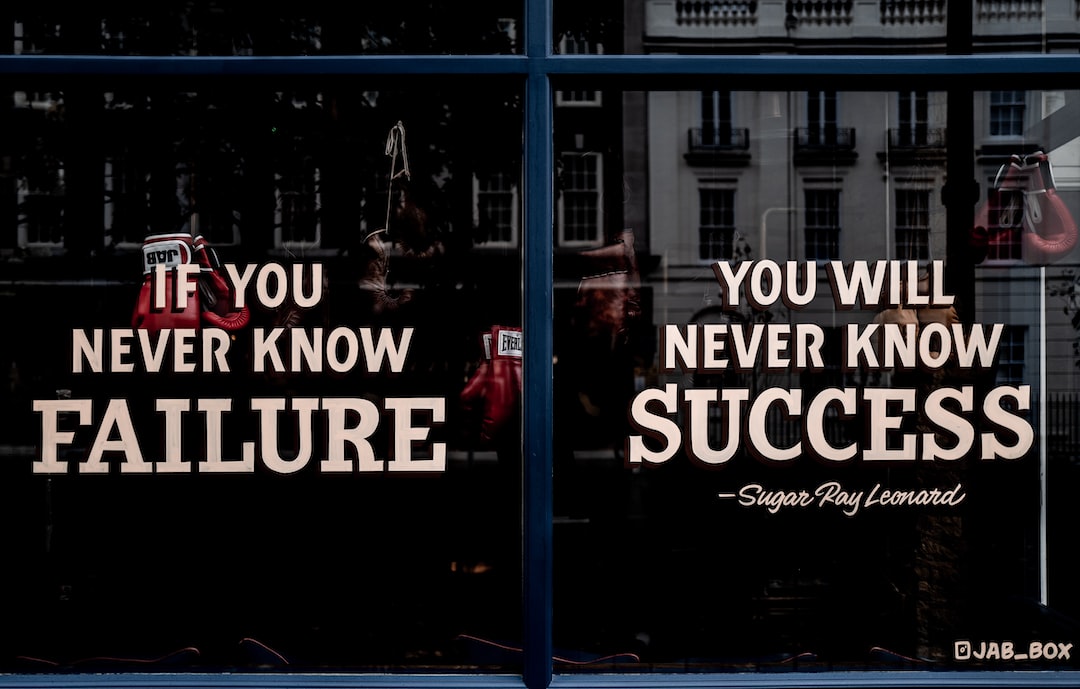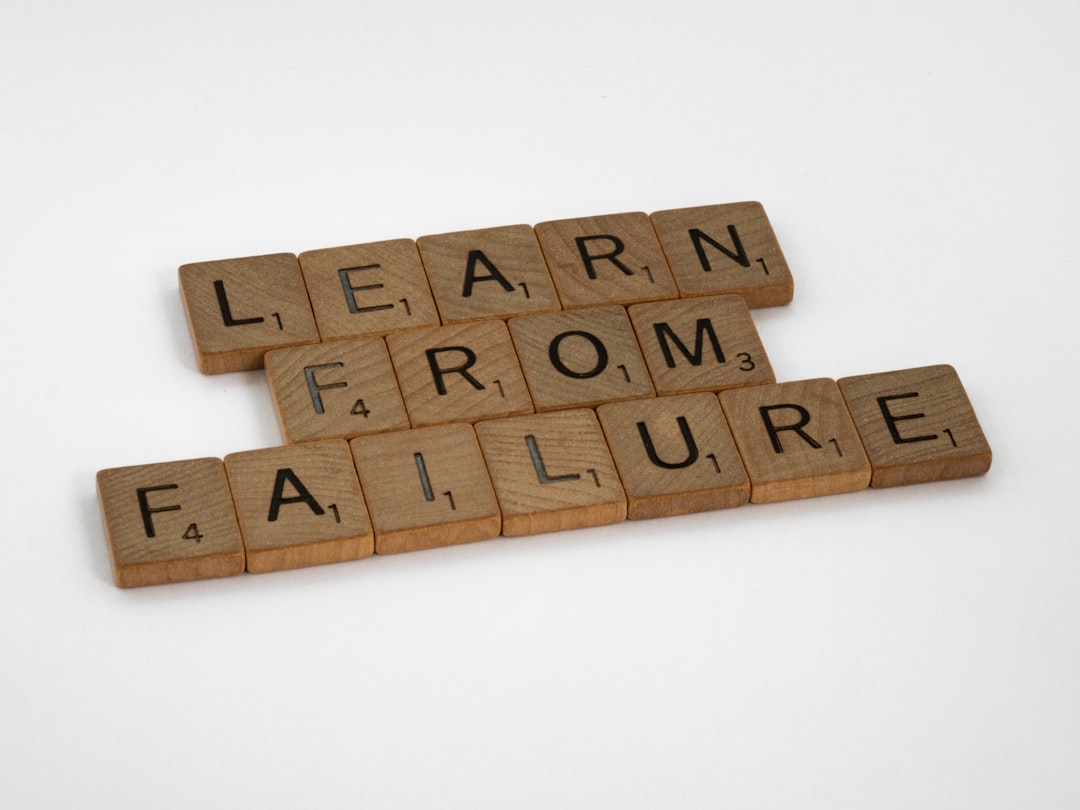Failure is often seen as a negative outcome, something to be avoided at all costs. However, what many people fail to realize is that failure can actually be a valuable learning opportunity. It’s important to embrace failure as a natural part of the learning process, rather than something to be feared.
In this blog post, we’ll explore the benefits of embracing failure, how to break free from the fear of failure, and the ways in which failure can actually help you grow and develop in your career. We’ll also look at some famous failures and their success stories, and provide strategies for embracing failure in your own career.
So if you’ve ever felt discouraged by a failure or afraid to take risks, this post is for you. By the end of it, you’ll have a new perspective on failure and the tools to turn it into a powerful tool for achieving career success. Let’s get started.
Embracing Failure as a Learning Opportunity
Failure is often viewed as something negative, something we should avoid at all costs. However, failure can actually be a valuable learning opportunity that can help us grow and develop as individuals. Embracing failure means accepting that it is a natural part of life and that it can actually lead to positive outcomes.
One of the main benefits of embracing failure is the opportunity it provides for growth and development. When we fail, we are forced to examine what went wrong and what we can do differently in the future. This process of self-reflection can be incredibly valuable, as it allows us to identify areas where we need to improve and make changes to our approach.
Furthermore, failure can also help us build resilience and perseverance. When we experience setbacks or obstacles, it can be easy to give up and feel discouraged. However, by embracing failure and using it as a learning opportunity, we can develop the mindset and skills needed to overcome challenges and persevere through difficult times.
It’s important to remember that failure is not a reflection of our worth or abilities. Rather, it is simply a part of the learning process. By embracing failure and using it as a tool for growth and development, we can achieve greater success in our personal and professional lives.
So, the next time you experience a setback or failure, try to view it as an opportunity for growth and learning. Ask yourself what you can do differently next time and use the experience to become a stronger, more resilient individual. By embracing failure, you can unlock your full potential and achieve greater success in all aspects of your life.
Ask yourself what you can do differently next time and use the experience to become a stronger, more resilient individual.
Breaking Free from the Fear of Failure
Failure is a natural part of life, and it is something that everyone experiences at some point. Despite this, many people have a deep-seated fear of failure that can prevent them from taking risks, trying new things, and pursuing their goals. This fear of failure can be paralyzing, and it can prevent individuals from achieving their full potential in their careers and in other areas of their lives.
So how can you break free from the fear of failure? The first step is to recognize that failure is not the end of the road. It is simply a setback, a learning opportunity, and a chance to grow and improve. When you can view failure in this way, you can start to approach it with a sense of curiosity and openness, rather than fear and dread.
Another key strategy for overcoming the fear of failure is to focus on the process, rather than the outcome. When you are too focused on achieving a particular outcome or goal, it can be easy to become overwhelmed by the fear of failure. Instead, try to focus on the steps you need to take to get there, and break down your goals into smaller, more manageable tasks. This can help you to stay focused and motivated, and to feel more in control of your progress.
It can also be helpful to reframe your thinking around failure. Rather than seeing failure as a personal failing or a reflection of your worth as a person, try to see it as a natural part of the learning process. Embrace the lessons that failure can teach you, and use them to inform your future decisions and actions.
Finally, it can be helpful to seek out support and encouragement from others. Talk to friends, family members, or colleagues who have experienced failure themselves, and learn from their experiences. Surround yourself with people who believe in you and your potential, and who can help you to stay positive and motivated even in the face of setbacks and challenges.
Breaking free from the fear of failure is an essential part of achieving career success and personal growth. By embracing failure as a learning opportunity, focusing on the process rather than the outcome, reframing your thinking, and seeking out support and encouragement, you can overcome the fear of failure and achieve your goals. So don’t let fear hold you back – embrace failure as a natural part of the journey, and use it to propel yourself forward towards success.
By embracing failure as a learning opportunity, focusing on the process rather than the outcome, reframing your thinking, and seeking out support and encouragement, you can overcome the fear of failure and achieve your goals.
The Benefits of Failure in Career Growth and Development
Failure is not a dead end, but rather a stepping stone to success. In fact, failure can be a powerful tool for career growth and development. While it may be difficult to see the benefits of failure in the moment, it is important to recognize how it can shape and mold us into better professionals.
One of the primary benefits of failure is that it can help us identify our weaknesses and areas for improvement. When we fail, we are forced to confront our shortcomings and identify where we need to focus our efforts in order to improve. This self-awareness is critical for personal and professional growth. By learning from our mistakes, we can become more knowledgeable, skilled and effective in our careers.
Another benefit of failure is that it can help us develop resilience and perseverance. When we experience failure, it can be tempting to give up and throw in the towel. However, those who are able to bounce back from failure and keep pushing forward are often the ones who achieve the most success. By learning how to pick ourselves up and keep going, we become more resilient and better equipped to handle the challenges that come our way.
In addition, failure can also help us develop a growth mindset. Those with a growth mindset view failure as an opportunity to learn and grow, rather than a reflection of their abilities. By adopting this mindset, we can become more open to new experiences and more willing to take risks in our careers. This can lead to greater creativity, innovation, and ultimately, success.
Finally, failure can also help us build stronger relationships with colleagues and clients. When we are open and vulnerable about our failures, we demonstrate authenticity and a willingness to learn. This can help us build trust with those around us, and ultimately lead to stronger, more productive relationships.
In short, failure is not something to be feared, but rather embraced as a valuable learning opportunity. By recognizing the benefits of failure in career growth and development, we can become more resilient, more creative, and ultimately more successful professionals.
One of the primary benefits of failure is that it can help us identify our weaknesses and areas for improvement.
Famous Failures and Their Success Stories
In this section, we will explore some of the most famous failures in history and how they went on to achieve great success. These stories serve as a reminder that failure is not the end of the road and can actually be a powerful tool for growth and development.
One of the most well-known examples of failure turning into success is that of Thomas Edison. Edison is known for inventing the light bulb, but what many people don’t know is that it took him over 1,000 attempts before he finally succeeded. When asked about his failures, Edison famously said, “I have not failed. I’ve just found 10,000 ways that won’t work.”
Another example is that of Steve Jobs, who was famously fired from Apple, the company he co-founded. Instead of giving up, Jobs went on to start NeXT Computer, which was eventually acquired by Apple, leading to Jobs’ return to the company and the creation of some of the most iconic products of our time, including the iPhone and iPad.
Oprah Winfrey is another example of someone who experienced failure early in her career. She was fired from her first job as a television news anchor and was told she was “unfit for TV.” But Oprah didn’t let that stop her. She went on to become the host of her own talk show, which eventually became one of the highest-rated shows of all time.
These stories serve as a powerful reminder that failure is not the end of the road. In fact, it can be a valuable learning experience that can lead to even greater success. By embracing failure and learning from it, we can develop the resilience and perseverance needed to achieve our goals.
In the next section, we will explore some strategies for embracing failure in your career and using it as a tool for growth and development.
When asked about his failures, Edison famously said, “I have not failed.
Strategies for Embracing Failure in Your Career
Embracing failure can be difficult, but it is an essential part of personal and professional growth. Here are some strategies to help you embrace failure in your career:
1. Change Your Mindset: Instead of seeing failure as a negative, see it as an opportunity to learn and grow. Failure is not a reflection of your worth or abilities, but rather a stepping stone towards success.
2. Take Risks: Taking calculated risks can help you step out of your comfort zone and challenge yourself. This can lead to new opportunities and experiences that can contribute to your personal and professional growth.
3. Set Realistic Goals: Setting goals that are challenging but achievable can help you push yourself without setting yourself up for failure. Celebrate your achievements, but also learn from your failures.
4. Learn from Mistakes: Instead of dwelling on your mistakes, take the time to reflect on what went wrong and how you can improve in the future. Use your failures as a learning opportunity to improve your skills and knowledge.
5. Seek Feedback: Feedback from colleagues, mentors, and managers can provide valuable insights into your strengths and weaknesses. Use constructive criticism to improve your performance and prevent future failures.
6. Surround Yourself with Support: Surround yourself with people who support you and your goals. Having a strong support system can help you stay motivated and positive, even in the face of failure.
Remember, failure is not the end of the road. It is a necessary part of personal and professional growth. Embracing failure can be challenging, but with the right mindset and strategies, you can turn your failures into opportunities for success.
It is a necessary part of personal and professional growth.
The Power of Failure in Achieving Career Success
Throughout this blog post, we have explored the concept of failure and its impact on career growth and development. While many individuals fear failure and view it as the end of the road, we have learned that failure can actually be a powerful tool for achieving success.
By embracing failure as a learning opportunity, breaking free from the fear of failure, and utilizing failure as a means for career growth and development, individuals can transform their careers and achieve their goals.
It is important to remember that failure is not a reflection of one’s worth or abilities. Instead, it is a natural part of the learning process and an opportunity to gain valuable insights and knowledge. With this mindset, individuals can approach failure with resilience and perseverance, using it as a means for personal and professional growth.
Throughout history, we have seen countless examples of individuals who have experienced failure on their path to success. From Thomas Edison and his numerous failed attempts to invent the light bulb to J.K. Rowling and her rejection letters for the Harry Potter series, these individuals persevered in the face of failure and ultimately achieved great success.
When it comes to embracing failure in your own career, there are several strategies that can be beneficial. These include seeking feedback, taking calculated risks, and reframing failure as a learning opportunity.
Ultimately, the power of failure lies in its ability to inspire growth, development, and progress. By embracing failure as a natural part of the learning process and using it as a means for personal and professional development, individuals can transform their careers and achieve their goals.
So, the next time you experience a setback or failure in your career, remember that this is not the end of the road. Instead, view it as an opportunity to learn, grow, and ultimately achieve success.





